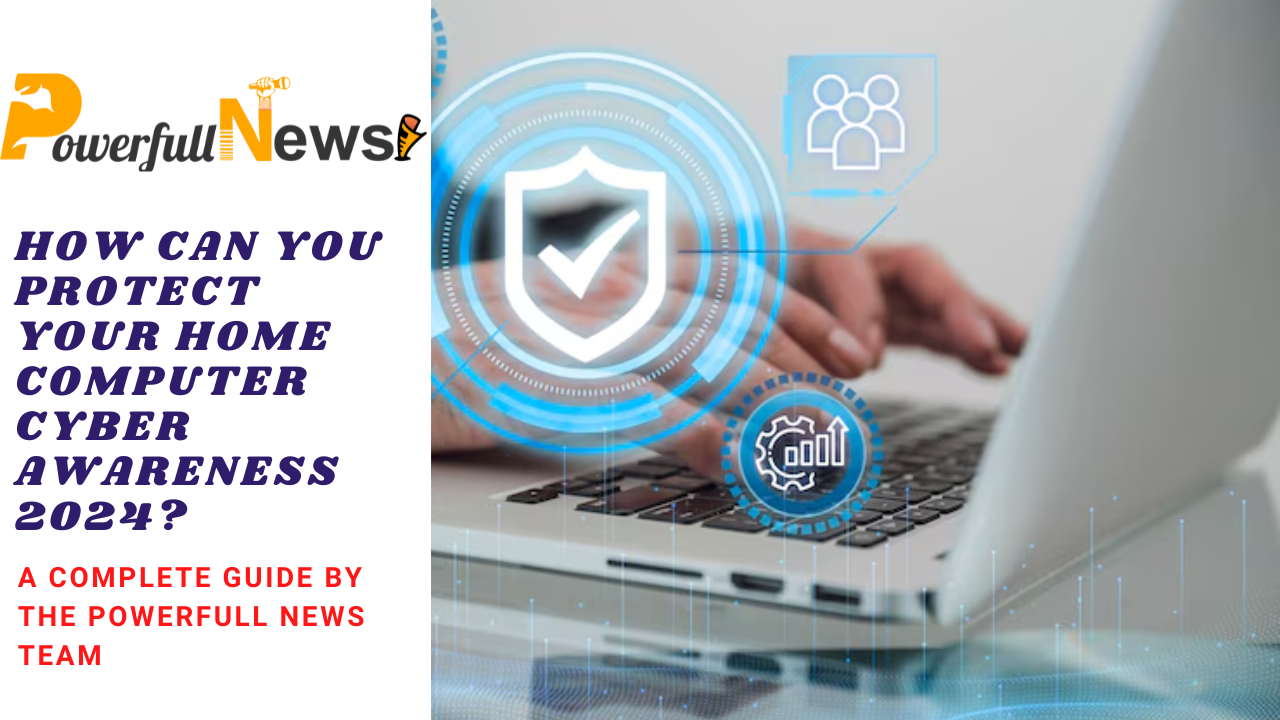In 2024, protecting our home computers from cyber threats is more important than ever. With the rise of threats like malware, ransomware, and data breaches, keeping our devices and info safe is key. This complete guide will cover why cybersecurity for home computers is vital, the dangers we face, and how to protect our digital lives.
Cyber attacks will likely become more complex and targeted in the next year, threatening our personal and household security. Knowing the risks of a cyber attack helps us understand why proactive cybersecurity is crucial. A breach can lead to financial loss and identity theft and disrupt our daily routines, causing lasting harm.
Key Takeaways
- Understand the evolving landscape of cyber threats and their potential consequences.
- Prioritize the installation and maintenance of robust antivirus and malware protection software.
- Ensure your home network and firewall are properly configured for optimal security.
- Keep your operating systems, software, and applications up-to-date to address vulnerabilities.
- Implement strong and unique password practices, including password managers and two-factor authentication.
- Educate yourself and your family on cybersecurity and online safety measures.
- Regularly back up your data to safeguard against ransomware and other data loss scenarios
The Importance of Cybersecurity for Home Computers
In today’s world, having strong cybersecurity best practices is crucial for home computers. Our lives are more connected to the internet than ever before. This means the risk of cyber-attacks has grown a lot.
Understanding the Risks and Threats
Home computers face many constantly changing threats, including malware and ransomware prevention. If you are hit by a cyber attack, the damage can be huge.
Bad guys use phishing scams and exploit software bugs. They also try to get past firewall protection and network security.
The Consequences of a Cyber Attack
If a cyber attack hits your home computer, the effects can be big and last long. You could lose data, have your money stolen, or even have your identity stolen. It’s important to follow cyber security tips and online safety measures.
To protect against these threats, it’s key to use antivirus software and home network protection. Doing so can lower the chance of a cyber attack’s bad effects.
How Can You Protect Your Home Computer Cyber Awareness 2024?
Protecting our home computers is now more important than ever. In 2024, keeping up with cybersecurity best practices is key. Let’s take a look at ways to keep your computer safe from threats.
Using antivirus software is a big part of protecting your computer. A good antivirus program can find and remove malware and viruses. Make sure to update your antivirus often to stay protected.
Firewall configuration and network security are also vital. A well-set firewall stops unauthorized access to your network, and using secure settings for your wireless router adds another layer of safety.
- Ensure your firewall is enabled and configured to monitor incoming and outgoing traffic.
- Use WPA2 or WPA3 encryption for your home Wi-Fi network to enhance security.
- Regularly update your router’s firmware to address any known vulnerabilities.
Being careful with software updates is crucial. Updates often fix security issues. Applying these updates quickly helps close the doors of cybercriminals, making your computer safer.
| Cybersecurity Best Practices | Description |
|---|---|
| Antivirus Software | Protect your system from malware, viruses, and other threats with a reliable antivirus program. |
| Firewall Configuration | Properly configure your firewall to monitor and control network traffic, enhancing your home network security. |
| Software Updates | Regularly apply software updates to address known security vulnerabilities and strengthen your system’s defenses. |
Following these cyber security tips and online safety measures can greatly improve your computer’s protection in 2024. This way, your digital space stays safe and strong against new threats.
Essential Cybersecurity Measures for Home Users
In today’s digital world, keeping your home computer safe is key to staying secure online and avoiding cyber attacks. Here are some vital steps every home user should take to protect their devices and personal info.
Antivirus and Malware Protection
Antivirus software is your best defense against malware, viruses, and other threats. Make sure to keep your antivirus software updated. This helps protect against new threats like ransomware and other harmful programs.
Firewall Configuration and Network Security
Setting up your firewall protection & Cyber Awareness 2024 right is key to keeping your home network safe. Ensure your firewall is turned on and set up to block unauthorized access and suspicious actions. Also, keep your Wi-Fi secure with a strong password and update your router’s software often.
| Cybersecurity Measure | Description |
|---|---|
| Antivirus Software | Protects against malware, viruses, and other online threats by detecting and removing harmful programs. |
| Firewall Protection | Monitors and controls the flow of incoming and outgoing network traffic, blocking unauthorized access and suspicious activities. |
| Network Security | Ensures the security of your home network, including securing your Wi-Fi connection and regularly updating router firmware. |
By following these cybersecurity tips and online safety measures, you can greatly improve the protection of your home computer. This helps keep your digital life safe from many cyber threats.
Keeping Your Software and Systems Up-to-Date
In today’s world, keeping your computer safe is key. Regular updates are essential for internet safety. They bring new features and fix bugs, helping protect against malware and ransomware prevention.
Not updating your system can leave you open to attacks. By keeping your software current, you boost your online safety measures and help protect your data from hackers.
To keep your computer safe, follow these steps:
- Enable automatic updates for your operating system always to have the latest version.
- Make your web browsers and other apps update automatically to reduce security risks.
- Regularly update your antivirus and firewall software for better home network protection.
- Pay attention to updates and fix them quickly to keep your cyber security tips strong.
Make updating your software a habit to protect your computer. This will help you avoid ransomware attacks and data breaches. Keep your systems updated for a safer online life.
Best Practices for Password Management and Authentication
Keeping your home computer safe from unauthorized access is key. Strong password management and authentication help a lot. By following best practices, you can make your digital world much safer.
Creating Strong and Unique Passwords
Strong, unique passwords are key to good password management. Don’t use easy-to-guess information like birthdays or pet names. Go for long, complex passwords with letters, numbers, and special characters. Changing your passwords often can also lower the risk of hacking your accounts.
Two-factor authentication and Password Managers
Consider using two-factor authentication (2FA) for your online accounts to boost your password security. This adds an extra step, like a code sent to your phone, to prove who you are. Using a password manager can also help. It lets you keep track of all your unique passwords, making it easier to stay secure without remembering many complex ones.
FAQs About Cyber Awareness 2024
What is the importance of cybersecurity for home computers in 2024?
Home computer security is key in 2024 because of the rise in cyber threats. These threats include malware, data breaches, and ransomware. With more people working and learning from home, strong security is needed to protect devices and personal info from cyber attacks.
What are the common risks and threats associated with home computers?
Home computers face risks like malware, data breaches, identity theft, phishing scams, and ransomware. These threats can cause personal data loss and financial fraud and disrupt daily life.
What are the consequences of a successful cyber attack on a home computer?
A successful cyber attack on a home computer can lead to severe outcomes. This includes losing personal and financial data, identity theft, financial fraud, and daily activity disruption. In some cases, getting access back may require paying a ransom.
What are the essential cybersecurity measures for home users to protect their computers?
Home users should install and update antivirus and malware software, set up a firewall, and keep software current. They should also use strong passwords, enable two-factor authentication, and be cautious of phishing scams. Backing up important data is also key.
How can home users ensure their software and systems are up-to-date?
Home users can keep software and systems current by enabling automatic updates and regularly checking for and installing updates. This helps fix known vulnerabilities and protects against new cyber threats.
What are the best practices for password management and authentication?
Create strong, unique passwords for each account for password management and authentication. Use a password manager for secure password storage and enable two-factor authentication when possible. This helps prevent unauthorized access to personal accounts and info.
Conclusion
In 2024, ensuring robust cybersecurity for home computers is more critical than ever due to the increasing sophistication of cyber threats like malware, ransomware, and data breaches. Individuals can significantly enhance their digital security by understanding the risks and implementing proactive measures, such as installing and updating antivirus software, configuring firewalls, maintaining software updates, and using strong passwords and two-factor authentication.
Educating yourself and your family on online safety and regularly backing up data further fortify your defenses against potential cyber-attacks. Taking these steps protects your personal and financial information and ensures a safer and more secure digital environment for your household.



